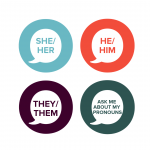Pronouns
What are pronouns?
A pronoun is a word used instead of a noun or noun phrase in place of a person’s chosen name. The most common pronouns used are “she, her, hers”, “he, him, his”, and “they, them, theirs”, and there are many more.
Why does Options for Sexual Health include pronouns in our emails?
At Options for Sexual Health, we are committed to providing a warm, welcoming, and inclusive environment for one another, and we encourage others to do the same. We recognize and honour all genders, and we make an effort to recognize those who are Two-Spirit, trans, non-binary, or gender non-conforming, and bring visibility to their concerns.
One way we can do this is by being more mindful about how we use pronouns.

Why does it matter?
We all use pronouns every day to refer to those around us, most of the time not even thinking about it.
It is common for people to assume others’ pronouns based on looks and name (e.g., someone looks feminine or has a feminine sounding name, so people automatically use “she, her, hers” to refer to them). It is also common to use “he/she” and “his or hers” when writing or speaking to recognize that they might be unsure of an individual’s gender.
This is problematic. Many individuals use a pronoun to refer to themselves that does not correspond to the pronoun people may assume they use based on looks or their name. Using “he/she” also reinforces the gender binary (that there are only two genders), when we know this is not true (there are many genders).
Assuming pronouns and using “he/she” erases the narratives and experiences of those identifying outside of the confines of male, female, man, and woman; non-binary people.
What can I do to show support?
Simple ways to use pronouns to show support:
- Ask someone’s pronouns before assuming which pronoun they use. Do this consistently, not just people you assume are gender nonconforming.
- Be aware of your social location when disclosing or asking about pronouns. If you have always been accepted for your gender, it may feel like no big deal, but if you are someone who has been frequently misgendered, it can feel charged or even dangerous. If it does not feel safe or comfortable to disclose your pronoun, it is okay to refrain from doing so.
- Share your pronouns in every day introductions, at meetings, and before public speaking to show that you are someone who supports proper pronoun usage and set a universal standard for sharing pronouns.
- If you are someone who has never had stress or fear around pronoun disclosure, answer simply and respectfully when disclosing your chosen pronoun. Some people may say “it doesn’t matter” or “I don’t care” because they have never had their identity challenged or faced danger through incorrect pronoun use. This can feel dismissive or condescending to people who experience harm by being misgendered.
- Introducing yourself with your pronouns is a great way to challenge the norm that these should be assumed, while creating space for those that might identify as transgender, queer, and/or non-binary. This can be done digitally by adding pronouns to your staff listing online and including pronouns in your email signature (you can include a link to this page to provide more in-depth information). In-person or over the phone, this can be done simply by creating space to share your pronouns when introducing yourself to others. For example, “Hello there, my name is Taylor and I use ‘they, them, theirs’ pronouns”.
- Be mindful that people who are gender nonconforming may use different pronouns in different areas of their life and they may not feel safe to disclose their gender identity in all settings. Leave space for people who may not want to include pronouns.
- Wear a pronoun pin. By displaying our pronouns it creates an atmosphere of inclusivity for everyone to be referred to in the way they want to be. Options for Sexual Health outreach booths at events will have pronoun pins available (like the ones in the image above) as well as at our Provincial Office and clinics in limited quantities. There are also many options to order online which often supports local crafters or non-profit organizations.
Additional resources:
Trans Care BC

